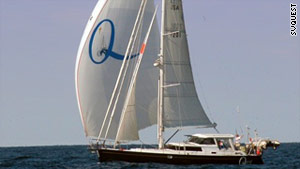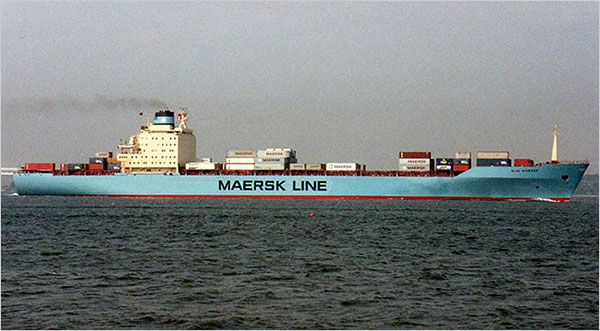Somali Piracy Creation Myths and the Tragedy of the Commons
There’s an interesting article in the Miami Herald, derived from an interview with one of the pirates apprehended off the coast of Somalia. Obviously, I can’t testify to the veracity of what the man has to say but I think it provides a little more context for the upsurge in piracy there:
In a long interview with McClatchy at the jailhouse in Mandhera, Eid related what amounts to the pirates’ creation myth, in which overfishing by European and Asian trawlers drove Somalia’s coastal communities to ruin and forced local fishermen to fight for their livelihoods.
In 1991, Eid was scavenging for lobsters along the craggy shores of central Somalia, when the government and its security forces were swallowed up in a coup. The country’s endless coastline — at almost 2,000 miles, it’s longer than the U.S. West Coast — suddenly became an unguarded supermarket of tuna, mackerel and other fish.
When huge foreign trawlers began appearing, the local fishermen who plied their trade with simple nets and small fiberglass boats were wiped out, Eid said.
”They fished everything — sharks, lobsters, eggs,” he recalled. “They collided with our boats. They came with giant nets and swept everything out of the sea.”
At the outset, fishermen in the ramshackle ports of Puntland, Somaliland’s rowdy neighbor, rebranded themselves as ”coast guards.” The first hijackings that Eid remembered came in 1997, when pirates seized a Chinese fishing vessel and then held a Kenyan ship for a $500,000 ransom.
”When I heard about this,” Eid said, “I was happy.”
In 2005, with catches all too rare and a wife and two children to support, he traded his fishing equipment for a couple of Kalashnikov rifles and rocket launchers in a market in the wild-west port of Bossasso.
He and five other fishermen, swathed in camouflage, piled into a motorized skiff and set off from the village of Garacad. But their motor was too feeble to catch up to any of the ships they spotted.
The next year Eid tried with a stronger engine, a German one imported from Dubai. This time, the novice pirates caught up to a cargo ship and came face to face with its European crew. But Eid’s men couldn’t prop their heavy metal ladder up against the freighter’s hull quickly enough to board the ship.
Global Witness, a London-based group that investigates natural resource exploitation, agrees that vessels from countries such as France, Spain, Indonesia and South Korea gobbled up hundreds of millions of dollars’ worth of fish from Somali waters without licenses.
However, experts say that the foreign fishing was not necessarily illegal because the Somali government did not delineate its territorial waters, as international maritime laws require.
It occurred to me that the situation presented a textbook example of the Tragedy of the Commons (the original article is here). Briefly, imagine a community that has a public grazing area, a commons. Each individual herder in the community is motivated in his own self-interest to maximize the number of his cattle that graze in the commons. Consequently, the commons is over-grazed and ruined.
A number of solutions to this problem have been proposed. It’s been taken as an argument for privatization: an owner is seen as more likely to prevent destruction of the grazing area. The original intent of the author was clearly to argue for robust government regulation. Or, as others have suggested, the herders could find a way to cooperate.
Somalia doesn’t have a government that can “delineate its territorial waters”, international institutions aren’t robust enough to prevent a tragedy of the commons (nor is it clear to me that we would want them to be), and whether caused by foreign competition or the Somalis themselves the fishing grounds off the Horn of Africa are more rather than less likely to be abused.
It’s been 12,000 years since the Neolithic Revolution in which population pressures moved humanity to begn to abandon its hunter-gatherer habit in favor of a sedentary agrarian one. Despite the passage of time and increasing population pressures there are still millions of people who make their livings as hunters and gatherers. Those employing means not a great deal more sophisticated than those used by people in the Neolithic will not be able to compete with modern industrial approaches to fishing, for example.
In the absence of some method of protecting the commons and the livelihoods it represents whether through privatization, more robust government regulation, or some other means, situations like the one off the coast of Somalia are likely to become more rather than less common. And unemployed fishermen will find some other way of making their livings.






The main problem here is that the pirates are typical liberals–wanting something for nothing. Since B. Hussein Obama is in league with his ancestorial “brothers” it is clear that these people will continue to act with impunity.
I strongly disagree with you, Triumph. I seriously doubt that Obama views Somali pirates as his “brothers.” But I would hope that he has enough compassion to care about people that won’t necessarily win him approval ratings.
So the pirates view themselves as throwing a tea party?
Seriously though, one can almost see a unifying force being created within Somali in opposition to the outside that could form the beginning of a nation-state.
Well, no it seems they’re willing to work for it – boarding ships like that can’t be effortless, and certainly has an element of risk. Doesn’t make what they’re doing right, but if you think it doesn’t take some gumption to do what they’re doing then you’ve never been at sea. Quite different than sitting around collecting welfare.
Exactly! They’re entrepreneurial self-starters who exemplify the best of the Ayn Randian John Galt persona. They should be given medals and celebrated by Fox News.
o, once again it’s all the fault of the prosperous.
One might even suggest there was a pattern to all of this finger pointing.
I’m thinking a shovel of salt is necessary here. For what…2 years he had no income and had a wife and children to support. For 2 years he was a failure as a pirate, but kept at it? I don’t know, but I’m thinking….mmmm Barvo Sierra. Tellling a story the reporter wants to hear and who eats it up with a spoon.
Should we let Joe in on the joke? Joe, Triumph often does…mmm…lets call it parody posting. Don’t take it seriously.
Related:
1/3 Of Our Oceans Need Fishing Ban
Steve – it’s not like he can just decide to switch careers and become a subsistence farmer, quickie mart clerk, cab driver, or commodities trader. In a failed state and subsistence agrarian society, you’re pretty much stuck with what you know.
So let me get this straight. After foreign fishing vessels who may or may not have taken catches illegally force the local fishermen to find other means of support, they do not attack the foreign fishing vessels and take their catch which the fishermen claim they have a priority right, no they attack innocent merchant vessels transiting hundreds of miles outside of any conceivable territorial claim Somalia could make. The steal the ships and their cargo, kidnap their crews and ransom same to the rightful owners but this is alright because some other guy stole their stuff.
Didn’t we put paid to this idiot idea of crime back in the ’70s when all the liberals were worried about the poor criminal and our cities were abandoned due to a lack of will for crime control?
JKB really isn’t making much sense… Who said they weren’t attacking the fishing ships? Hell if the catch is decimated the foreigners would of moved on by then anyway. Two wrongs doesn’t make a right but acknowledging the wrongs doesn’t mean you’re condoning them. If you wish to truly solve a problem like this then local motivations are an important factor.
Dave, you’ve got it all wrong. The Somali fisherfolk were hoarding their unearned and undeserved wealth that a mere accident of birth had given them in the form of unspoiled fisheries. All the European fleets were doing was redistributing that wealth to the proletariat of their countries. The only mistake the Euros made was in not waiting to have that outcome dictated by the government.
I think Matt pretty much has it right (well, except perhaps for the last sentence).
Personalize it … if some GM employee at the end of your street got canned and he needed to feed his wife and family, would you look the other way as he beat your kid up and stole his lunch money?
Perhaps you would go to his house and sit down with him and tell him you feel his pain, but it’s wrong for him to beat up your kid and steal his money – except any time you try approach his house he takes a shot at you from an upstairs window. Maybe you could call a neighborhood association meeting and explain to all of the other neighbors that he’s out of a job and ask them to give him their kid’s lunch money so he would leave your kid alone.
Or maybe, the next time he picks on your kid you just beat his ass and tell him to leave your kid alone or else! If you’re strong enough and you have a reputation that you mean what you say, I’d guess that he would probably leave your kid alone and find some other way to feed his family.
Yes I know, and if you were to look at it all and write it down and try to figure out how he made a living something isn’t adding up.
1. He had fishing equipment.
2. Gave it away for some Kalashnikovs.
3. Tried pirating in year x, no luck.
4. Tried pirating in year x+1, again no luck.
Something doesn’t add up. Did he eat one of the kalashnikovs?
An AK can help feed your family in more ways than one.
Once he has resorted to violent crime to feed his family, any large easy target will be tempting.
The decimation of the coastal fisheries near Somalia (largely by developed nations) does mean one less option on a very short list faced by Somalis. That does not mean piracy is justified. It does mean that piracy is likely to increase, particularly if you live somewhere with no effective law enforcement.
I think Steve has made a good point about this pirate’s story. He is, after all, trying to explain away a criminal act.
On the other hand, Bystander’s analogy is a stretch, and poorly played out. For one thing, where’s the part where somebody stole his fish? Second, we’re not dealing with one guy who we can just call the cops on. Even if there were no cops, beating him up is playing with fire. Instead of leaving your family alone, he might just shoot your kid from his window. Or he might just steal from someone else’s kid now. The problem hasn’t been solved.
That’s a very Millennial Western framework Steve. No chance that family connections which could have given him food or shelter?
Outside the Modern Welfare State that’s where you go.
So if we were somehow to miraculously replenish the fish stocks, the pirates will give up their life of crime and go back to subsistence fishing? I doubt it. The Somalies were forced to seek new ways to make a living and discovered crime with few consequences. If we want to solve the problem, we have to make the cost of being a pirate go way up.
Oh look, the truth is that the piracy is a simple capitalist money making scheme. And rooted out by NPR no less.
But it does give a method combat the pirates that doesn’t require shooting them. The governments of the world must seek out the Somali piracy seed capital and seize the proceeds. Place the financiers on the SDN list and subject them to prosecution should they ever fall under a port state jurisdiction. An embargo of products such as speed boats, etc needed for piracy should be imposed to keep them from the pirates. Any shipper, vessel operator or vessel owner found to assist in circumventing the embargo should be blackballed from obtaining hull, cargo and P&I insurance or doing business in the shipping industry forever.